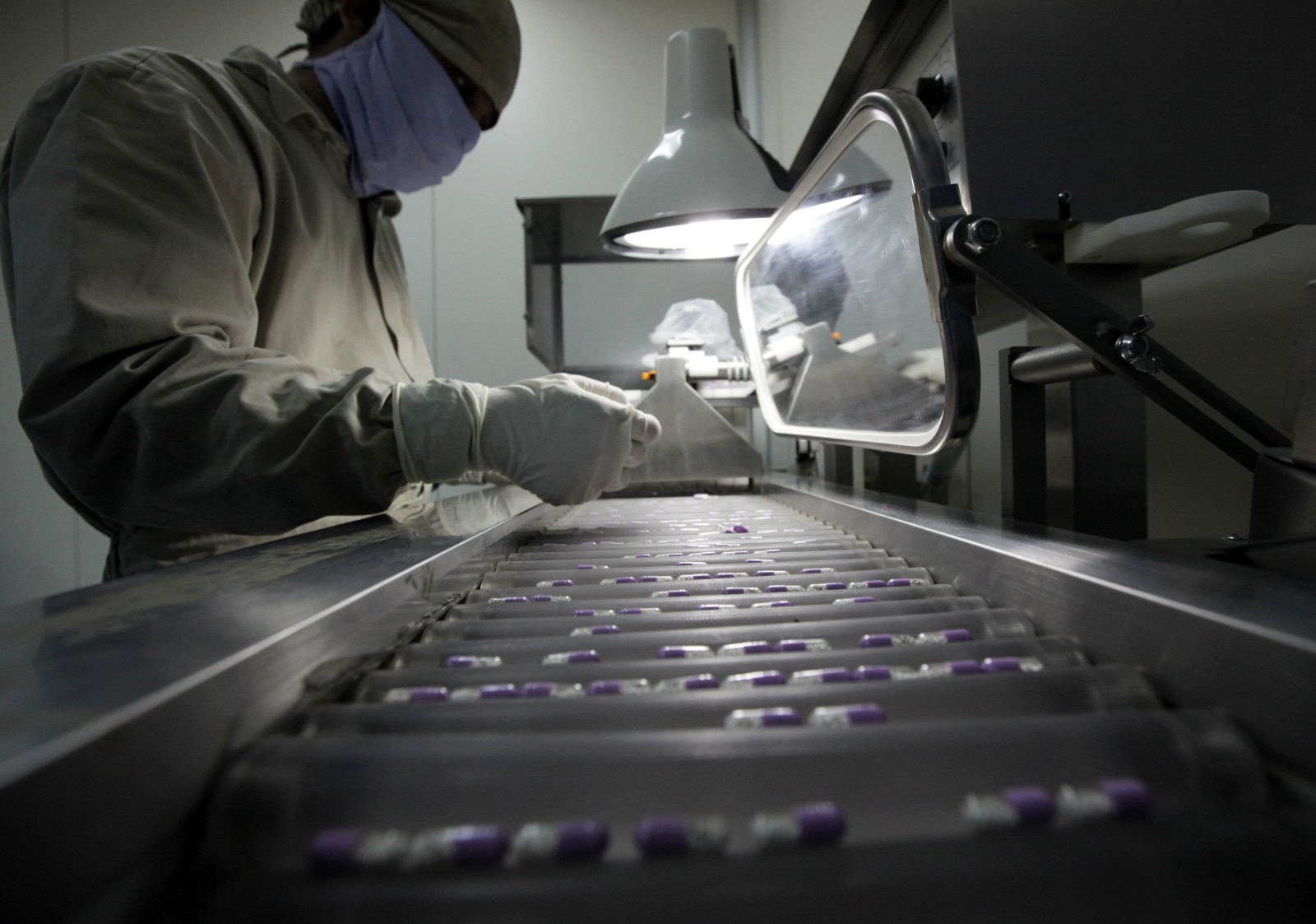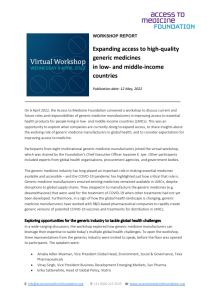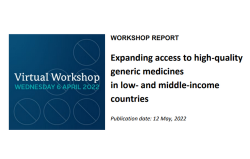Generics companies are exploring new ways to increase access to medicine
The conventional 'high-volume' / 'low-cost' model for generic medicines is changing, with companies exploring new mechanisms for reaching more people with their products.
Participants shared strategies for overcoming the challenges of launching their products in low- and middle-income countries (LMICs), such as registration hurdles and lack of clarity about demand.
The wide-ranging discussion has been captured by the Access to Medicine Foundation in a new meeting report, available for download.
The workshop is a first step towards a framework that the Foundation will use to assess how generic medicine manufacturers are improving access to medicine.

The COVID-19 pandemic has spotlighted the central – yet changing – role of the generics industry in the global health landscape. During this period of crisis, generic medicine manufacturers ensured existing medicines remained available in LMICs, and stepped up production of generic products needed to treat the virus, despite disruptions to global supply chains. In addition, they worked with R&D-based pharmaceutical companies to rapidly create generic versions of patented COVID-19 vaccines and treatments for distribution in LMICs.
The generic medicine industry has long played a critical role in expanding access to essential medicines – but the nature and extent of that role is now evolving. Increasingly, generic medicine manufacturers acknowledge the proactive ways they can expand access to their products in LMICs, beyond the conventional model of producing drugs in high volumes and selling them at relatively low prices.
As highlighted in the Access to Medicine Foundation's virtual workshop on 6 April 2022, companies are identifying opportunities to increase access, and are exploring commercially viable ways to launch products in LMICs. The workshop was joined by participants from eight multinational generic medicine manufacturers, as well as experts from global health organisations, procurement agencies, and government bodies.
"It is vitally important that all healthcare sectors address inequality and improve access, which we have articulated in our new Strategic Direction. With this workshop we were able to take the unprecedented step of bringing top generic medicine manufacturers together to discuss areas where progress is most needed, and the necessary steps to solve the problem.” – Jayasree K. Iyer, CEO, Access to Medicine Foundation
This workshop, which is part of the Access to Medicine Foundation's new research programme focused on the generic medicine industry, provided a first opportunity for open discussion about current and future roles and responsibilities of generic medicine manufacturers in improving access to essential health products for people living in LMICs.
Ensuring access to generic medicines in LMICs: 3 key takeaways
Participants shared examples of what companies are currently doing to expand access, and explored ways of finding solutions to common challenges. These insights, which are explored in greater depth in the meeting report, include developing networks and relationships to better understand local needs; exploring solutions around payment; investing in local manufacturing to ensure continuous reply; taking up licensing opportunities; and making use of collaborative registration procedures.
The meeting report identifies three key takeaways from the workshop:
By manufacturing drugs at high volumes and selling them for relatively low costs, the generics industry already plays a significant role in expanding access to medicine.
However, simply producing a generic product does not guarantee access to that product in LMICs – and this is especially the case when it comes to low-income countries.
As indicated by participants in the workshop, there is a broad consensus that generic medicine manufacturers have an opportunity to actively expand access to their essential health products in LMICs and ensure a continuous supply of high-quality generic medicines and biosimilars, beyond the traditional high-volume / low-cost business model.
Generic medicine manufacturers can develop business models with long-term sustainability of access at their core, reconciling the need for commercial viability with approaches that result in greater access to generics and biosimilars in LMICs.
Over recent decades, multistakeholder efforts to ensure universal access to treatments for diseases including HIV, TB and malaria have led to valuable insights, some of which can be used to inform strategies more widely; but viable business models can also be identified and implemented in disease areas that have not received such international attention and funding.
Workshop participants highlighted a range of approaches to expanding access sustainably, including engaging in public-private partnerships to engage in regional procurement initiatives and build local capacity. There are ways to explore whether a new approach is viable, such as by starting small and scaling up; in other cases, companies can take a ‘leap of faith’.
Particular challenges exist in LMICs that can deter generic medicine manufacturers, such as registration hurdles and lower commercial market potential. One common challenge is that, when the original brand-name product was not introduced or made widely accessible in many LMICs, launching the generic version in those countries can be a more uncertain prospect.
To overcome such challenges and provide equitable access to their products, companies can capitalise on their at-scale manufacturing expertise and adaptive R&D capacities, while also developing new approaches to support broad access and affordability. For example, they can enter into partnerships to better understand demand for the product, and therefore align supply; they can leverage collaborative registration procedures; and they can adapt products to better suit the needs of patients living in LMICs.
As part of the Foundation’s Strategic Direction for 2022- 2026, we are expanding the range of companies and healthcare sectors that we aim to mobilise in the global effort to overcome healthcare inequality, and this will include the generic medicine industry.
The Foundation will engage companies that hold dominant positions in key regional markets, including some of the largest multinational players in the generic sector, to evaluate companies’ actions in access, identify opportunities to bridge key access gaps, and capture best practices.
Informed by discussions in this workshop, as well as by conversations with a range of experts and stakeholders, the Foundation is developing an assessment framework that will outline generic medicine manufacturers' roles and responsibilities in expanding access to high-quality generic medicines and biosimilars.

